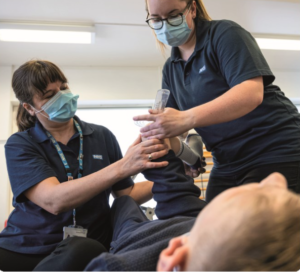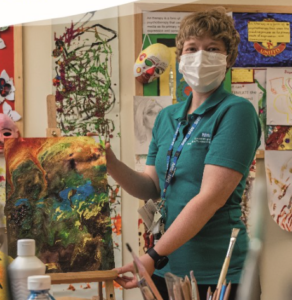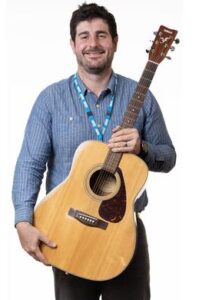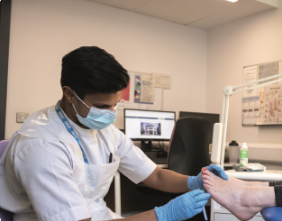Allied health professionals
The Talent for Care team can support your career as an allied health professional by providing apprenticeships and training opportunities that are designed to give you access to the best teaching resources and hands-on experience.
Click on each role to find out more.
-
AHP support roles
-
Band 2 assistants
Band 2 staff may be called a therapy apprentice or assistant. They support and work under the guidance of registered allied health professionals (AHPs) to provide patient care.
There are a wide variety of AHP support roles available in the Trust. You may work alongside a single profession, such as a speech and language therapist, or within a team supporting a range of allied health professions.
You could work with people of all ages in a variety of settings, such as inpatient wards, clinics, family homes, schools, nurseries or care homes.
Typical duties may include:
- working with people in a range of environments
- supporting patients to achieve their goals
- supporting patients to take part in activity and exercise programmes
- working with families and carers of people accessing services
- working with AHPs and other assistant staff
- providing basic equipment to patients
- cleaning equipment
- completing basic administrative tasks.
Example of a Band 2 role:
Physiotherapy assistant
Physiotherapy assistants work with people of all ages with a wide variety of conditions. They work under the direction of a physiotherapist to support the patient to achieve their goals through activity and exercise, such as assisting patients to either gain or regain their mobility or strength. They can assess for some types of mobility equipment, such as walking aids, and will assist physiotherapists and other assistants to carry out assessments and therapy.
Find out more about becoming a physiotherapy assistant.
Career pathway
We expect good literacy and numeracy skills and ask for GCSEs (or equivalent) in English and Maths. We also ask for a healthcare qualification such as BTEC or NVQ or equivalent in Level 2 Health and Social Care.
For most positions, we expect some prior experience in healthcare or care work in the form of paid, voluntary, work experience or placement work. If we recognise good talent without these requirements, you may be eligible for our apprenticeship route instead.
-
Band 3 assistants
Band 3 staff may be called an assistant, a technical instructor, or a rehab assistant or technician.
Within the Trust there are a wide variety of AHP support roles available; you may work in a profession specific role, such as podiatry, or you may work in a team supporting a range of allied health professions. This could include occupational therapy, speech and language therapy and physiotherapy. Often, these teams support a specific therapy or rehabilitation programme, which could be in a community or inpatient setting.
Typical duties of these roles may include:
- supporting patients to achieve their goals
- supporting patients to take part in activity and exercise programmes
- supporting patients to understand and manage a long-term condition
- working with patients' families and carers
- assessing patients and providing equipment
- supervising patients to complete specialised interventions
- writing reports.
Example of Band 3 role:
Podiatry – foot care assistants
Podiatry assistants, or foot care assistants (FCA’s), are an essential part of the clinical team. They work under the guidance of a podiatrist to care for patients that are experiencing issues with their feet and legs.
As well as working with patients, they carry out clinical administration work.
Typical duties for this role may include:
- providing treatment or wound care
- providing insoles/orthoses
- assisting with surgical procedures and local anaesthesia
- completing patient health checks
- administration and patient bookings
- maintaining healthcare equipment
- managing stock levels
- promoting a healthy lifestyle
Training as a podiatry assistant will include patient assessment, nail care skills, and basic wound redressing. Assistants are required to complete the Care Certificate and the Royal College of Podiatry foot care assistant qualification.
Career pathway
We expect good literacy and numeracy skills and ask for GCSEs (or equivalent) in English and Maths. We also ask for a healthcare qualification such as BTEC, NVQ or equivalent in Level 3 Health and Social Care.
For most positions, we expect some prior experience in healthcare or care work in the form of paid, voluntary, work experience or placement work. If we recognise good talent without these requirements, you may be eligible for our apprenticeship route instead.
Training as a band 3 assistant will include completion of the Care Certificate.
-
Band 4 assistant practitioners
Assistant practitioners work under the supervision and guidance of registered healthcare professionals. They can complete patient assessments and may help to deliver interventions to support patients in their recovery from illness or injury. The duties of the role will vary depending on the place of work.
Typical duties for these roles may include:
- supporting patients to achieve their goals
- providing education and advice to patients and carers
- supporting patients to take part in activity and exercise programmes
- supporting patients to understand and manage a long-term condition
- working with families and carers
- managing a caseload of patients with supervision from an allied health professional
- completing therapy assessments
- delivering group interventions to patients
- working in partnership with other organisations
- writing reports about the care and treatment a patient has received.
Examples of Band 4 roles include:
Speech and language therapy assistants (SLTAs):
SLTAs work with people of all ages and a variety of conditions, such as developmental speech and language difficulties, acquired speech and language difficulties (for example, following a stroke), hearing impairment, cleft palate, head and neck cancer, learning disabilities, and autism. They may help with assessments and carry out therapy with individuals or groups, following a plan devised by a speech and language therapist. SLTAs also support therapists with the delivery of training to other professionals and make resources such as communication books.
Career pathway
We expect good literacy and numeracy skills and ask for GCSEs (or equivalent) in English and Maths. You will also need to complete The Care Certificate and prior experience in healthcare or care work in the form of paid, voluntary, work experience or placement work. We would expect you to have a Level 5 healthcare qualification, such as an assistant practitioner or nursing associate.
-
Band 2 assistants
-
Registered professions
Within the Trust, there are multiple allied health professions that require registration with professional bodies. To register, you will normally be required to have a degree qualification as well as a master's degree.
-
Occupational therapist
Occupational therapists provide care and support to people with physical, psychological, or social problems that are caused by an illness or disability.
Occupational therapists help people to overcome all kinds of day-to-day challenges and support them to live as independently as possible. This might involve helping them to learn new ways of doing things or making changes to the environment to make things easier.
At our Trust, occupational therapists work with a range of patients from children and young people to adults and older adults. Many of our occupational therapists will travel between sites across Coventry and Warwickshire to deliver care to people in the community. They work in all of our services and may specialise in learning disabilities, mental health, or community health and wellbeing.
Occupational therapists need to be patient, have a caring manner, and be able to work creatively to meet the needs of each individual. They also need to be knowledgeable regarding practical approaches to support patients in achieving as much independence as possible, so that they can live full and satisfying lives.
Career Pathway
To become an occupational therapist, you will need to obtain a BSc in Occupational Therapy to be eligible for registration with the Health and Care Professions Council.
The Trust offers an integrated degree apprenticeship for this role, as well as an integrated master’s degree. To apply for these courses, we expect a Level 4 qualification in a relevant role, a Level 3 qualification in a health-related subject, and GCSE’s A-C/9-4 or Level 2 Functional Skills in Maths and English.
As these apprenticeships are Level 6 and 7, aspiring applicants must have already secured a relevant position at Coventry and Warwickshire Partnership NHS Trust. Contact talentforcare@covwarkpt.nhs.uk for more information.
-
Physiotherapist

Physiotherapists supporting patient
Physiotherapists support people to improve their mobility, this may be after an accident or injury, or due to ageing or a disability. They asses the body as a whole and treat each patient individually.
Physiotherapists support people by:
- providing general advice and knowledge about factors that can affect a patient’s experience of everyday life, such as techniques and postures aimed at preventing injuries
- using manual therapy. This is a practical approach that involves the physiotherapist using their hands to relieve pain and stress, as well as encourage better body movement
- recommending exercises to improve overall health, and mobility and to strengthen areas of the body. These exercises are movement-related and tailored for the patient by the physiotherapist, as well as supplemented with advice for physical activity.
At Coventry and Warwickshire Partnership NHS Trust, physiotherapists work within our mental health, learning disability and autism, and community physical health services. Physiotherapists may travel to patients’ homes or other areas where support is required, to provide excellent care. Physiotherapists work with people of all ages, including children and young people, adults, and older adults.
Career Pathway
To become a physiotherapist at our Trust, you will need to have a BSc in Physiotherapy, as well as eligibility for registration with the Health and Care Professions Council.
The Trust offers an integrated degree apprenticeship to equip you with the skills, knowledge, behaviours, and experience for this role, and we also offer an integrated master’s degree for Physiotherapy.
To apply for these courses, we expect a Level 4 qualification in a relevant role, a Level 3 qualification in a health-related subject, and GCSE’s A-C/9-4 or Level 2 Functional Skills in Maths and English.
As these apprenticeships are Level 6 and 7, aspiring applicants must have already secured a relevant position at Coventry and Warwickshire Partnership NHS Trust. Contact talentforcare@covwarkpt.nhs.uk for more information.
-
Art Therapist

Art therapists support patients' recovery by helping them to explore their feelings and emotions through creativity
Art therapists help people to deal with complex or confusing emotional issues, using media as a form of expression and communication. Within our Trust art therapists work at sites in Coventry, Warwickshire and Solihull, supporting a wide range of people in our mental health and learning disability and autism services. Art therapists are registered through the Health and Care Professions Council.
Typical duties for this role may include:
- consulting with the principal clinical psychologist to develop and embed art therapy practices into the service
- assessing patients to identify if art therapy is an appropriate therapeutic approach, and offer opinions regarding the suitability of this approach and the nature of the intervention.
- planning, coordinating and implementing specialised evidence-based art therapy
- providing supervision of trainee art therapists and other colleagues
- being responsible for therapeutic equipment
- communicating assessment results, formulations, outcome data, and other complex and sensitive information orally and in written form to support the work of multi-disciplinary teams
- contributing to the development of art therapy and the service
- contributing to service promotion and goals. This may require attending external conferences, as well as contributing to peer reviews and research publications.
Career Pathway
To become an art therapist, you will need to obtain a relevant degree qualification and a postgraduate diploma/Master’s programme that has been approved by the Health and Care Professions Council.
If you are already employed by the Trust, there may be an opportunity for you to undertake an apprenticeship for this job role. We expect applicants who are applying for a clinical role to have evidence of their completed Care Certificate, plus GCSE’s A-C/9-4 or Functional Skills in Maths and English (or equivalent). For this apprenticeship standard, we would expect staff to have a relevant Level 6 qualification and experience in therapy. Contact talentforcare@covwarkpt.nhs.uk for more information.
-
Dramatherapist
Dramatherapists support the recovery and wellbeing of people with physical, mental, or emotional difficulties or illness, by using aspects of drama and theatre to help patients explore and reflect on their feelings.
Dramatherapists use practices such as role play, voice work, movement, and storytelling to enable patients to explore solutions to personal issues. They help to create a safe environment to allow patients to confidently express themselves.
Typical duties of this role may include:
- planning and facilitating group and/or individual dramatherapy treatment programmes
- carrying out assessments and visits to support a patient's treatment plan
- creating an open, safe, and secure space for patients to freely express themselves and build upon their self-confidence and self-awareness
- monitoring and evaluating a patient's progress and writing accurate reports.
Career pathway
To become a dramatherapist, you will need to obtain a relevant degree qualification and a postgraduate diploma/Master's programme that has been approved by the Health and Care Professions Council.
-
Music therapist

Music therapists support the recovery and wellbeing of people with physical, mental, or emotional difficulties or illness, by engaging them in live musical interactions. Through music, they help people to communicate and navigate feelings which may be complex or difficult to put into words.
Music therapists work with the natural musicality of people and may use a variety of instruments, including voice. Patients do not need to have experience playing an instrument, as this is an established psychological clinical intervention which aims to develop their communication skills and improve self-confidence and independence.
Music therapy can help people who have communication difficulties due to a disability, illness or injury with their psychological, emotional, cognitive, physical, and social needs. Within our Trust, music therapists work within many of our services including learning disability and autism, and community health and wellbeing.
Typical duties may include:
- working closely with the consultant psychologist to develop and embed music therapy as a part of the service
- assessing patients when music therapy is considered to be a suitable therapeutic approach and offer opinion about the suitability and nature of the intervention
- planning, coordinating and implementing specialised, collaborative, goal orientated, evidence-based music therapy
- communicating assessment results, formulations, outcome data, and other complex and sensitive information orally and in written form to support the work of multi-disciplinary colleagues.
Career Pathway
To become a music therapist, you will need to obtain a relevant degree qualification and a postgraduate diploma/Master's programme that has been approved by the Health and Care Professions Council.
-
Speech and Language Therapist
Speech and language therapists (SaLTs) provide specialist care to help people overcome or adapt to difficulties with their speech, language, communication, and swallowing. This can include working with children and adults, with conditions ranging from childhood lisps to the aftermath of a stroke.
Typical duties of this role may include:
- identifying and carrying out an assessment of a patient's speech and communication difficulty or disorder
- delivering speech and language interventions
- providing specialist speech and language therapy to patients with a range of highly complex needs
- providing specialist clinical support and supervision to other speech and language therapists, assistants, students, and team members
- working with colleagues from different disciplines
- providing specialist advice
Career pathway
To become a speech and language therapist you will need to have a BSc (Hons) in Speech and Language Therapy and be registered with the Health and Care Professions Council. We expect candidates to have GCSE's A-C/9-4 or Level 2 Functional Skills in Maths and English (or equivalent), as well as a certificate of completion of the Care Certificate.
If we recognise good talent, Talent for Care can help you in obtaining these qualifications.
The Trust also offers a speech and language therapy apprenticeship which will provide learners with a BSc in Speech and Language Therapy and eligibility to apply for registration with the Health and Care Professions Council.
To apply for this course, applicants should possess a Level 3 qualification, GCSE's A-C/9-4 or Level 2 Functional Skills in Maths and English, the Care Certificate, and experience in speech and language therapy services. As this is a degree-level apprenticeship, this apprenticeship is only available to Coventry and Warwickshire Partnership NHS Trust members of staff. Contact talentforcare@covwarkpt.nhs.uk for more information.
-
Podiatry

Podiatrists see patients who have a foot problem combined with an underlying medical condition
Podiatrists see patients that are 'at risk' who have a foot problem combined with an underlying medical condition which has affected the circulation and sensation in their lower leg or foot. These conditions may cause problems with the patient's foot health and mobility. Examples of patients classified as 'at risk' may include people with diabetes, rheumatoid arthritis, cerebral palsy, peripheral arterial disease, and peripheral nerve damage.
Podiatrists help people deal with a range of mobility issues, relieve pain and treat infections of the feet and lower legs.
Typical duties of this role may include:
- working in specialist podiatry clinics with a wide range of 'at risk' patients, managing caseloads, and providing them with excellent levels of care
- carrying out assessment, diagnosis, treatment, advice, and discharge of patients, or providing leadership and support to members of the podiatry team with these tasks
- demonstrating clinical reasoning and autonomy, including carrying out procedures, and to discharge or refer onwards when service criteria specifications are not met
Career pathway
To become a podiatrist, you will need a BSc in Podiatry, and be registered with the Health and Care Professions Council.
-
Dietitian
Dietitians convert the science of nutrition into advice regarding food and advise people on their food and nutrition choices.
Dietitians promote good health by working with patients who have special dietary needs and assess, diagnose, and treat dietary and nutritional problems.
Dietitians are the only nutritional professional regulated by law and are governed by an ethical code to ensure that they work to high standards.
Within our Trust, dietitians work as part of a multidisciplinary team, which means they work in collaboration with other specialist healthcare professionals to provide the best care. This is often with a community focus.
Typical duties of this role may include:
- providing specialist dietetic assessment, diagnosis, and treatment programmes to patients with complex needs
- holding a clinical caseload of patients and working without direct supervision in higher banding roles
- providing expert advice, signposting, guidance and information to health and social care professionals, clients, carers, relatives, or other non-professional contacts
- contributing to the clinical discharge planning process and onward referral as required
Career pathway
To become a dietitian, you will need an approved qualification in dietetics at a BSc level, or a first-class degree in a relevant subject, alongside an approved postgraduate qualification in dietetics. You must also be registered with the Health and Care Professions Council.
-
Advanced Clinical Practitioner
Advanced clinical practitioners (ACPs) are healthcare professionals who have advanced knowledge regarding the scope of their practice. They use their expert clinical skills and knowledge to provide care and treatment to a patient during their time with us.
Advanced clinical practitioners work with individuals on a one-to-one basis, as well as alongside colleagues in a team setting.
At CWPT our advanced clinical practitioners have a range of qualified professional backgrounds including nursing, occupational therapy and physiotherapy.
General duties of the role include:
- assessing and diagnosing patients
- planning and evaluating treatments and care for patients
- prescribing and reviewing medication
- providing leadership and management, education, and research.
Career pathway
We expect advanced clinical practitioners to have a master's ACP qualification, a professional registration in healthcare, and GCSE’s A-C/9-4 or Level 2 Functional Skills in Maths and English.
For internal talent, aspiring candidates must possess a professional registration in healthcare, GCSE’s A-C/9-4 or Level 2 Functional Skills in Maths and English, 12 months experience within their chosen field and obtain the permission of their manager and service.
With further training and experience, advanced clinical practitioners may progress into a clinical management role. For more information, contact talentforcare@covwarkpt.nhs.uk.
-
Occupational therapist
Click on each role to find out more.
To see our current vacancies, visit our vacancy page!
